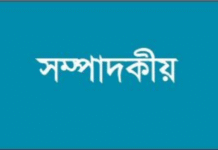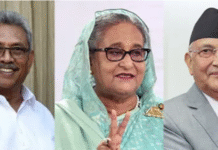
Dr Iftekharuzzaman is Executive Director, Transparency International Bangladesh (TIB). In this interview with Badiuzzaman Bay of The Daily Star, he talks about distinctive features of corruption in Bangladesh, the role of the ACC, the government’s anti-corruption drive, and ways to curb systemic corruption.
What questions should we be asking about corruption in Bangladesh that we are not?
Corruption challenges in certain sectors are not much asked about. Media is one of them. Media and the space for it have always faced challenges, more so in recent times, and its implications for democratic progress has been the subject of some research. We all want things to turn around so the media can play its due role. But very little is heard about corruption in the media itself.
The media as a sector and media houses as individual organisations—both conventional and nonconventional ones—are powerful entities. It will be naive to think that this power is not being abused to serve or protect corporate interests. The tendencies of some media houses to deliberately target their corporate competitors are well-known. There are examples of media houses joining the bandwagon of sycophancy not merely to survive political pressures but also to promote vested interests. That’s abuse of media power, another form of corruption. There are also allegations of media houses depriving their staff of due salaries and benefits. How many of them have their account books in a state to be proud of? Aren’t there examples of gender-based discrimination? Is sextortion a non-issue? One can go on.
The other industry that receives scant attention in the anti-corruption discourse is defence, which is vulnerable to corruption almost everywhere in the world. In our case, the credibility of this extremely important sector of public interest could be much higher if resources and commercial enterprises at their disposal were subjected to public scrutiny.
How would you describe the nature of corruption in Bangladesh? Is there anything distinctive about it compared to other countries?
For over two decades, Bangladesh has been performing commendably in many socioeconomic indicators like GDP, but corruption remains widespread. Corruption costs the country at least 2-3 percent of GDP. Bangladesh is no longer at the bottom of the list of countries worst-affected by corruption as it was for five successive years from 2001 to 2005. It, however, continues to rank among countries where corruption is perceived to be most pervasive, and remains second lowest in South Asia, behind only Afghanistan. Parallel with other costs of corruption, money laundering is a major concern for Bangladesh, as conservative estimates put the amount of annual illicit transfers out of the country at over USD 10 billion, most of it through improper invoicing in foreign trade.
Corruption does exist everywhere in the world. In our case, regrettably, it has spread over the whole society and nearly become a way of life. One of our recent surveys showed that 89 percent of the victims of corruption in service delivery sectors are forced to pay bribes because, without it, there would be no access to such services.
The other striking feature of corruption in Bangladesh is the dichotomy. Corruption, officially, is subjected to zero tolerance as the head of government has repeatedly pronounced it as a pledge. I have not heard such firm pledges from many of her peers elsewhere in the world. However, the irony is that little concrete actions are seen to enforce this commitment.
Corruption in the health sector has been the main talking point this year, for obvious reasons. Does it mean other sectors have been less affected?
The coronavirus has pushed the discourse on corruption in the health sector to the forefront. Corrupt practices have long been tolerated in this sector, both at service delivery and higher levels. At the high level, procurement and supplies have been fodder for a festival of corruption by a section of vendors with political linkages who were allowed to form syndicates of triangular collusion thanks to the collaboration of a section of officials and politically powerful individuals. Their peers at the lower levels didn’t want to be left out, as they also indulged in various corrupt activities including theft and misappropriation of relief materials.
However, it will be naive to consider the health sector as an exception. As per TIB’s research done over the years, it is rather one of those sectors moderately affected by corruption, with others, like law enforcement agencies, ranking much higher. Therefore, I suspect that if any other sector was put under such stress as the health sector was by coronavirus, one would find similar, if not higher, levels of vulnerability to corruption.
In an interview last September, you said that what we know of graft from media reports is but the tip of an iceberg. Most cases that come out involve junior to mid-level politicians, officials, politically connected businessmen, etc—small fries, really, in the big scheme of things. So what (or who) else does the iceberg contain?
The iceberg contains the heavyweights. Generally, there are two broad categories of corruption. One is petty corruption at the service delivery level, involving a two-way transaction in which one party—the collectors or duty bearers—is the gainer while the bribe-payer, as a service recipient, becomes involved as the victim. What we usually observe is that some such bribe-takers, usually low- and lower-mid-level officers or staff, are investigated, which make headlines in the media.
However, the second category of corruption involves a win-win game in public contracting, supplies and bigger deals in which the triangular collusive arrangements take place, which are hardly brought to the net of the enforcement agencies like the ACC. Even if some of them are selectively caught from time to time, the whole syndicate remains unperturbed.
A classic example of corruption in the financial sector is that of the loan defaulters of Basic Bank where the key decision-makers in the reported illicit deals continue to enjoy impunity. The much-talked-about Regent Hospital case may take the same direction. The individuals directly involved are being investigated, but the “iceberg”—or those who are responsible for making Regent the talk of the nation—will probably enjoy the proverbial impunity!
The Anti-Corruption Commission is clearly failing to perform its mandated duty. Given how it is allowed to function, is it realistic to expect the ACC to check corruption without a major overhaul?
Indeed, it is unrealistic to expect the ACC to fully deliver its mandate without a major overhaul. The question is what such an overhaul implies. Our successive research have shown that in terms of legal provisions and institutional mandate, the ACC has the potential to successfully control corruption. But its investigating capacity leaves much to be desired—in terms of the skills and expertise necessary, honesty and integrity of the staff, and sufficient internal control and oversight to prevent lapses and irregularities. In many cases, investigation is taken as an opportunity for rent-seeking by the relevant officials through collusion and often extortion with the investigated party.
There also seems to be a self-imposed dividing line drawn by the ACC authority beyond which it is unsure, unable, reluctant, or fearful of going, depending on the identity, status or linkages of the individuals concerned. There is a perception within the ACC that it should not antagonise the powers that be. As a matter of fact, the perception problem is seen at both ends. Since the ACC has been created by the government, a section of the government considers it to be a government body, as does the ACC. What’s lost on both sides is that the ACC is supposed to be a state institution serving public interests rather than that of the government.
Do you think the government’s anti-corruption drive has failed?
Anti-corruption efforts, commonly touted as “drive”, have not succeeded because those were destined to fail. The prime minister’s personal commitment in this context is noteworthy. She declared that no one would be spared, including those from within her party. That’s also the reason why it failed to deliver.
While the PM may have meant business, those whose responsibility it is to implement the pledge couldn’t serve the cause as many of them are among beneficiaries, participants, colluders, protectors and promoters of corruption. Corruption is not only deeply institutionalised, but also a way of life for them. Political or governmental position or linkage is considered as a license for self-enrichment via abuse of power. This is as much a statement of fact as a determining factor for the enforcement agencies including the ACC.
Experts often talk about the importance of depoliticising the administration which would lead to stronger mechanisms of accountability. This is easier said than done, of course. What measures should we take that can realistically help us curb systemic corruption?
I agree that dysfunctionality of institutions due to politicisation has become so entrenched that it cannot be changed overnight. But we need to get the ball rolling. This could start from ensuring open, fair and genuinely competitive processes of recruitment, transfers, postings and promotions. We have laws, rules and regulations for that. What’s missing is their application. One of the powerful keys is to disclose income and wealth statements of all public officials and publicly exposed persons for scrutiny of accumulated wealth against legitimate incomes. Managing conflict of interest to prevent any business relation of publicly exposed persons with the government funds could make a difference. Equally important is the adoption of global standards for automatic exchange of information on financial accounts that could facilitate robust tracking of financial flows within and across borders preventing various forms of money laundering.
Depoliticisation of administration will not happen by administrative action alone. It has to be a political decision. Our politicians have to face the mirror and rediscover what politics is about and realise that, whatever it is, politics is not about plundering public resources by abuse of power.









